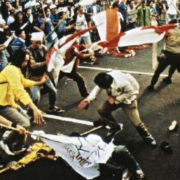
United Liberation Movement for West Papua (ULMPB) leaders Octovianus Mote and Benny Wenda. Photo by Stefan Armbruster / SBS World News.
This post is the third in a three part series. Here is part 1 and part 2.
The decision of the Melanesian Spearhead Group (MSG) in June to grant the West Papuan umbrella organisation, the United Liberation Movement for West Papua (ULMPB), “observer” status and upgrade Indonesia from “observer” to “associate member” was not the outcome sought by either the Indonesian government or the ULMPB. This is the first time, however, that the Indonesian government and a West Papuan organisation have had a seat at the same table in an international forum.
Manasseh Sogavarem, chair of the MSG and prime minister of the Solomon Islands, explained that the MSG’s objective was to facilitate dialogue between the ULMWP and Indonesia. He posited the West Papua issue as: “a test of our genuineness to solve a problem between two nextdoor neighbours in the interest of regional peace and stability.” According to Sogavarem, it would also test the MSG’s commitment to human rights and the rule of law.
Octovianus Mote, the ULMPB’s secretary general, welcomed the decision as an “historic achievement” and a first step towards full political recognition. Members of House of Representatives Commission I, which oversees foreign affairs and defence, meanwhile, were divided in their opinions. Tantowi Yahya, Golkar deputy head, thought that Indonesia’s lobbying had failed and he feared that MSG’s recognition could lead to independence for Papua. Elnino Husein Mohi, from the Greater Indonesia Party (Gerindra), was not concerned about the move, provided it did not disturb national unity or help destabilizing foreign influences. In contrast, Effendi Simbolon, an Indonesian Democratic Party of Struggle (PDI-P) legislator, thought Indonesia’s association with the MSG would allow the issue of Papua to be contained.
Since 2000, the island states of the Pacific have been the focus of diplomatic lobbying campaigns by both pro-independence Papuans and the Indonesian government. The MSG states have not been of one mind about Papua, and their decisions have ebbed and flowed. Some decisions have favoured the Papuans, such as in 2013, when West Papua’s right of self-determination was recognized and concerns expressed about human rights abuses. Others have reflected the political influence and resources of Indonesia, a member of the G20.
The Papuan applications for membership of the MSG have been based on the premise that West Papua is a Melanesian territory, sharing the same culture and values as the other Melanesian peoples represented in the MSG. Being Melanesian has been a central tenet in the construction of Papuan nationalism. It is used by Papuans to distinguish themselves from Indonesians, and identify themselves with Melanesian societies to the east, rather than the neighbouring islands to the west. In the last decades of Dutch rule, Papuans fashioned their identity in distinction to the officials, police, teachers and missionaries from Maluku.
Meanwhile, in its lobbying to the MSG, Indonesia has argued that five of its provinces, Maluku, North Maluku and East Nusa Tenggara, as well as the two Papuan provinces, are Melanesian. Armanatha Nasir, Foreign Affairs Ministry spokesman, explained: “We have 11 million Melanesians. If you combine the whole population of the MSG countries, I don’t think they reach 11 million. So, if we talk about Melanesians, we’re talking about Indonesia. We are the biggest Melanesian country. So we will be the biggest elephant in the room if we’re not part of the MSG.”
The Indonesian government’s arguments about Melanesia might seem a curious revival of colonial ethnography dating back to Alfred Russel Wallace’s division of the inhabitants of the archipelago into “Malayan” and “Polynesian” races. They do not, however, reflect how the residents of the other Melanesian provinces think about their cultural identity. At last year’s Maluku Culture Congress, the governor depicted Maluku culture as being formed through an interaction with Arabs, Chinese, Europeans, Persians and Indians, as well as Melanesians. In the debates among Ambonese from the 1910s about their place in the archipelago, none of the participants – pro-Indonesia, pro-Netherlands or pro-independence – thought of themselves as Melanesians.

The legitimacy of the ULMBP rests on the broad support of its member organisations in Papua. Photo by Octovianus Mote.
This creative diplomatic ethnography was reflected in the MSG’s decision to grant Indonesia associate membership representing the five provinces. At the same time, however, the MSG recognised the ULMPB as the representative of Melanesians living outside Papua. This accommodation of rival Papuan and Indonesian claims left the issue of representativeness in dispute. The legitimacy of the ULMPB rests on the broad support of its member organizations in Papua and the fact that five of its leaders, including Octovianus, had been appointed as negotiators with the Indonesian Government at the 2011 Papua Peace Conference in Jayapura. Before the MSG meeting, the National Committee for West Papua (KNPB), one of the members of the ULMPB with a strong support base inside Papua, collected a petition of more than 150,000 signatures supporting the ULMPB as the representative of the West Papuan people at the MSG. It claimed that until 15 June, 507 activists had been detained while collecting the petition. Papua New Guinea Prime Minister Peter O’Neill added further complexity to the issue of representativeness, suggesting that the elected leaders of the five provinces act as representatives to the MSG. O’Neill’s suggestion was supported by one of Indonesia’s senior delegates, Wiwiek Setyawati Firman, who asserted that only the two elected governors could represent Papuans.
The ULMPB’s observer status at the MSG is a significant development. The MSG has provided Papuans with their first seat at the table in an international forum. The two previous posts have argued that under Susilo Bambang Yudhoyono and Joko Widodo, Indonesia has proved unwilling to engage in a dialogue with Papuans. Sogavarem, the MSG head, has established the goal of facilitating a dialogue. Engaging with both the ULMPB and the Papuan governors, as O’Neill suggests, may be a way around Jakarta’s reluctance.










